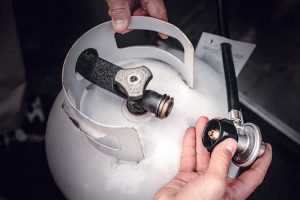Summer grill cylinder safety
Grill cylinder use is at its highest during the summer months, which makes it a great time to remind all stakeholders about grill cylinder safety.
Issues such as cylinder maintenance, proper storage, transportation, grill hookup, grill location, refill inspection procedures and dispensing-employee personal protection equipment are just a few key topics to keep in mind when dealing with customers and employees.
The Propane Education & Research Council (PERC) video “Dispensing Propane Safely” is an excellent tool, and I recommend all marketers distribute it liberally, both in-house and to vendor dispenser customers. I believe the video is also beneficial for consumers, as it teaches them what to expect when getting their cylinders refilled.
For years I have been concerned about refill cylinder inspection compliance. My friend Dan told me a story about a local fuel and propane retailer who inspected eight of his commercial property grill cylinders and rejected one for being out of qualification.
The requalification date is an important compliance step that documents inspection of tank condition. The retailer said he did not requalify cylinders and recommended that my friend take his cylinder to an exchange retailer. The retailer also told my friend to look at the requalification date on the new exchange cylinder to make sure he didn’t get a soon-to-be-out-of-date cylinder – especially if he planned to get it refilled later.
This story is encouraging for a couple of reasons.

Retailers should always inspect propane cylinders for condition and qualification. Photos courtesy of the Propane Education & Research Council
One, the retailer did his job properly by inspecting cylinders for condition and qualification. Two, he gave the consumer good advice about how to deal with out-of-qualification cylinders and to check the date on an exchange cylinder he planned to keep.
The assumption is that exchange folks take care of these issues as they perform their refill inspection. And most exchange vendors do a pretty good job of compliance and providing a safe, convenient product. However, many consumers find that hanging onto a cylinder in good condition and having it refilled to be both economical and a way to maintain owned-cylinder quality control.
We had a tragic accident in Minnesota where a dispenser employee was filling a 100-pound cylinder that was out of qualification. The actual cause of the explosion would not be obvious to most refill employees. However, had the employee rejected the cylinder, the accident may not have happened.
Filling an out-of-qualification cylinder may seem like a small compromise, but after an accident related to a grease fire or a poor hookup too close to a building, some expert may try to tie the cause to failure to comply with cylinder inspection requirements prior to filling.
When you do things right the first time, you never have to apologize for compromise.
Consumer education is a major factor in preventing grill cylinder accidents. We all go to parties where grill cylinders are in heavy use. Golf course hamburger shacks also provide a good spot to check for safety – especially if your company’s name is on the tank. I always take a minute to discuss grill cylinder safety with the hosts and employees.
■ I check the tank for a sleeve and pull it off while explaining refill inspection and qualification in the event they get the tank refilled as opposed to exchanged.
■ I discuss grill location and storage, along with cylinder storage and the importance of turning the valve off after use.
■ I check for clogged burners and grease buildup exposures.
■ I recommend a soapy solution spray on the connection when they hook up a new tank.
PERC has a wealth of consumer education material on small cylinder safety. I recommend you visit the current product catalog on PERC’s website (propanecouncil.org/productcatalog) to review your options for promoting grill cylinder safety with employees, refill vendors and consumers alike.
Whether you communicate via mail, email, social network, handouts or face to face, it’s important to remind your employees, vendors and customers about grill cylinder safety.
Jay Johnston is an insurance executive, safety management consultant and motivational safety speaker in the propane industry. He can be reached at 612-802-0663 or jay@thesafetyleader.com.
















